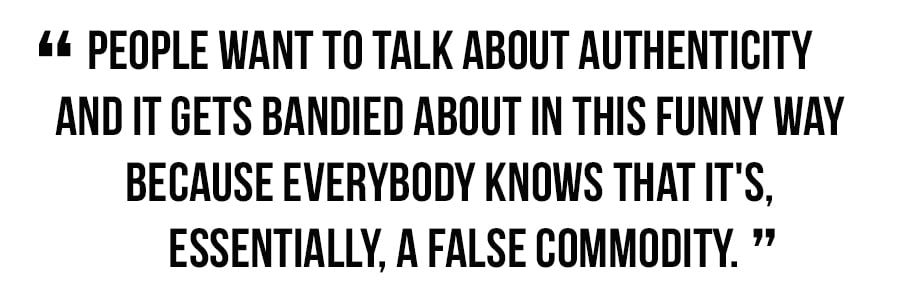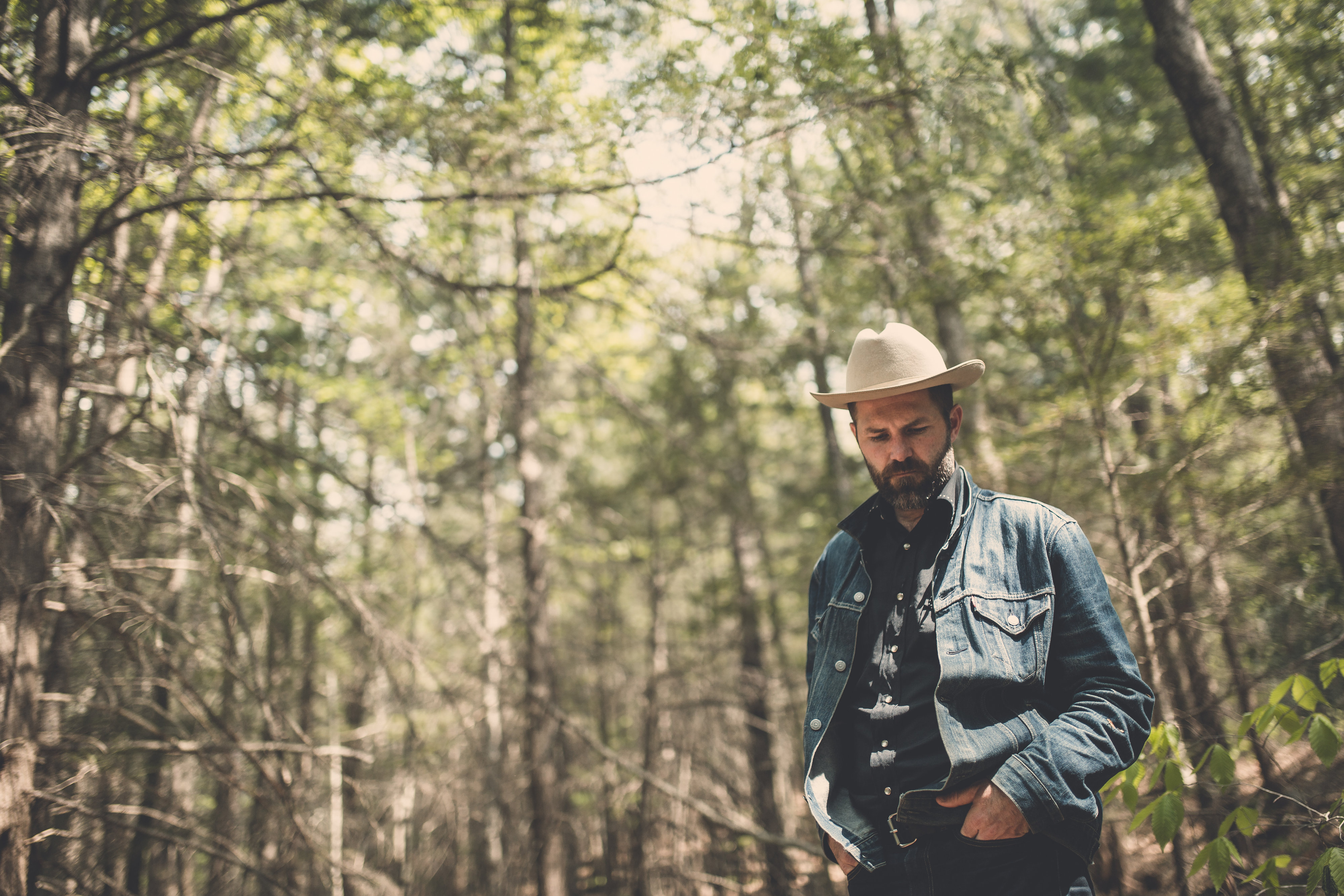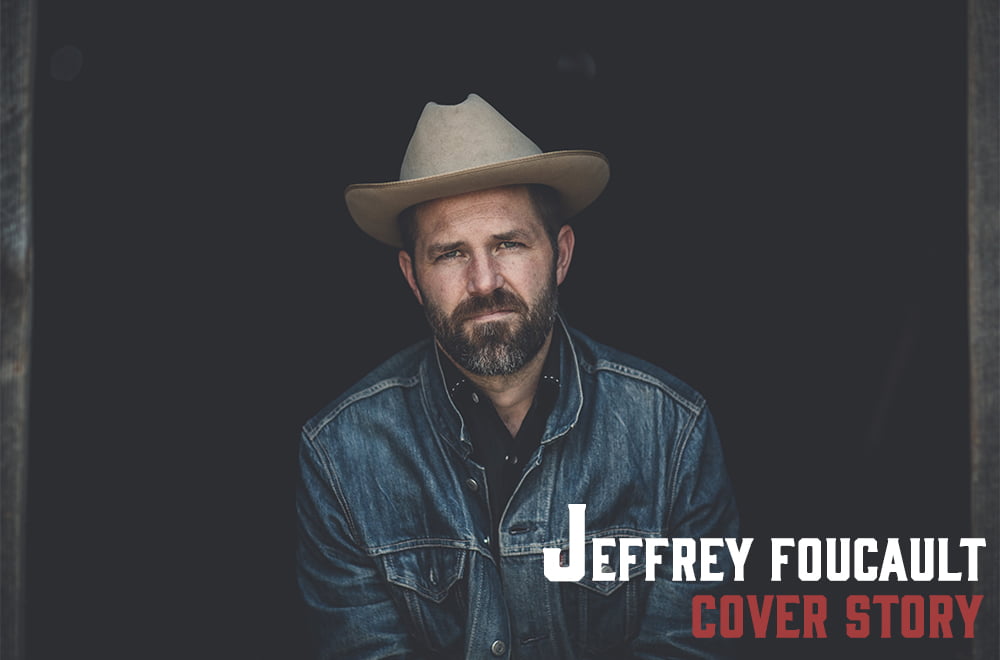Listening to Jeffrey Foucault's records — even just perusing his album covers — gives the sense that he's the kind of guy who lives close to earth, unafraid to get his hands dirty … literally or metaphorically. It's easy to imagine him standing in a river or driving down a highway contemplating capital “l” Life. That vision comes through, once again, on his latest release, Salt as Wolves. Through his songs, Foucault explores his world from the inside out, rolling it all around in his head to get to the heart of every matter.
I feel like you'd be a great guy to sit around a fire discussing existential issues with, but here we are, so …
[Laughs] That's all diligent branding on the part of my team. I'm no fun at all … as a rule. Nobody wants to drink with me. [Laughs] No. Actually, I'm probably much better sitting around the fire than I am behind a microphone. But that may be true of everybody. I don't know.
[Laughs] Probably! So, Western Massachusetts, where you live … I haven't been up there in a while, but I'm thinking it may not be as infiltrated with hipsters as Nashville, Portland, and Brooklyn are …
[Laughs] You know what's funny is that, the town I live in is this really tiny, work-a-day town in the eastern foothills of the Berkshires. There's a beautiful river, the Deerfield River, that runs down the middle of it and bisects the village. There are about 800 people on one side and 800 on the other, and there are no traffic lights, no fast food. It's very quiet. This time of year, and a little bit in the summer, people come up from Brooklyn. The rest of the time, it's just the people who live here. It's still a good mix. It's that thing in New England where places become sort of professionally quaint where it's like, as my grandma used to say, “Ye olde fucking everything.”
But, all of a sudden, you look around and you're like, “Wait a minute!” because there'll be some dude walking down the street who looks like he just stepped out of an American Apparel ad. Then it's, “Oh, right. People come up to look at the leaves.” You forget about it, then you see them and remember that's what Brooklyn and Portland look like. There it is … in your town.
[Laughs] Exactly. Those cats are going for this “authentic” living vibe, but they could learn a thing or two about it from you.
[Laughs] It's funny you mention that. I had the weirdest day yesterday. Normally, I'm too low on time to get in enough firewood for the whole year to heat the house, so I usually call Roberts Brothers Lumber, which is local, and they'll deliver me some wood. This year, everybody ordered early and there was no firewood left. So I went out and bought a new chainsaw and all the stuff I need — a helmet with the clamp-on ear muffs and the face protector and stuff. I didn't get chaps. I didn't think I could quite pull off chaps.
So I went out yesterday morning with a buddy and we felled trees all morning. Then, yesterday evening — this is where it gets weird — Don Henley invited me and my wife down to see his show at the Beacon in New York City. He's been covering one of my songs for years, and we'd been vaguely in touch, so I went down there. I went from the authentic and slightly self-aware lumberjack with my suspenders on to “Let me put on my cowboy shirt and drive to meet Don Henley” … which is surreal. Utterly surreal. All the way around.

[Laughs] Just a day in the life …
Exactly.
It's even funnier because I was going to ask you to describe a day in your life for me. So, thank you.
That's a weird one. That's how they go.
But my drummer, Billy Conway, is probably about as authentic a human … people want to talk about authenticity and it gets bandied about in this funny way because everybody knows that it's, essentially, a false commodity. Billy is like a wandering holy man. I don't think he's ever bought a piece of clothing. He just wears whatever the hell he's going to wear. And he cuts his hair about once a year. He's a ranch hand. He's a cowboy. He's got 300 or 400 head of lowline Angus cattle that he's taking care of up in Montana. He's just authentic enough to really make people nervous. [Laughs] We'll be at the airport and he might get bumped up to first class because we fly a lot and have a lot of points. So they'll bump him up and, more than once, they'll be like, “Um, sir? Are you sure you're supposed to be here?” They've actually asked him if he's sure he's supposed to be on the plane at all, like maybe he was just panhandling in the airport. [Laughs]
[Laughs] Oh, man! Do you remember the first time you heard him play? And the moment you knew he was your guy?
That's an excellent question because I remember it perfectly. I'd heard him play on records, of course, with Morphine and he produced my wife Kris's [Delmhorst] first two records. So I was putting together a band for the Cold Satellite project. And I felt like the drummer was going to be important, so I asked Kris, “Who's the best drummer that we know?” She said, “Billy Conway … but I think he just moved to Montana.” And we were going to work up in Vermont on that record.
So I wrote him and said, “Hey, we're going to make this record. The two records I've been listening to the most in the last two years that would be the touchstones for recording, certainly in terms of the approach and feel, would be Ooh La La by the Faces and Tonight's the Night by Neil Young.” He said, “Those are my two favorite records and I just happen to be coming East that week for something else. Count me in.”
Nice!
So we show up at the studio and I'd never even met him. I'd heard about him for years because everybody knows and loves him. We start talking and we cut one song on that record, called “Twice I Left Her,” that I tried to write like a Doc Boggs, dark, banjo tune but I played it on guitar. We decided to kick the band out and do it, the two of us. We were in an open room so I was about 20 feet away from him and he put me 100 percent in the tractor beam. He's a really soulful musician. You can feel the gravity field of any room he's playing in change. He looked me dead in the eye while we were playing that tune. I didn't know what to do. I didn't look away. We just lined straight on it and cut that tune in one take. That was it.
I never thought I'd be able to play a duo thing with just a drummer. After the Satellite thing was over, I was out in Montana playing at KGLT on Live from the Divide. I asked Billy if he wanted to play it with me on his suitcase kit or whatever. We did this one show and everything clicked in my head: “This is what I should be doing all the time. Me and Bill.” I never expected that. I never thought, if I found my all-the-time tour partner, it would be a drummer. Sure enough, he's from Minnesota, I'm from Wisconsin. We both make the bed in our hotel before we check out. He's the only guy I've ever been on the road with who gets up before I do and brings me a cup of coffee at 7:30 in the morning. [Laughs]
[Laughs] So it was pretty obvious that he was your guy.
Yeah, yeah. “You're hired!” He doesn't like to drive, is the only problem.
Ah! There's always something. Is that how you gents came up with the concept of, basically, “If you can carry it in, you can play it” at a show?
That was actually a rule in Billy's first band that went big, before Morphine. They were called Treat Her Right. They were tight with Los Lobos. They opened for everybody from Bob Dylan to Bonnie Raitt. You name it. They went through the major label ringer and never got famous on their own. They had this really stripped-down thing. They didn't sound like anybody and they didn't compete with anybody, so everybody loved them to open because they had a light footprint and weren't going to get in anybody's way. That was their thing: If you're going to play it, you gotta be able to carry it into the club on your own steam in one trip.
Let's get a little philosophical because the simplicity of that set up calls to mind the premise you posit in “Slow Talker”: “There’s one note, if you can play it. There’s one word, if you can say it. There’s one prayer, if you can pray it. And each one is the same.”
You bet.
And, in this overly complicated world, I think that's right. So … what's the one note/word/prayer … for you?
Oh … yeah. [Laughs] Well … it's something that's out there beyond you that you can never quite get a hold of. I mean, you get it in little stretches, little moments where you become a part of something larger, something that's sublime. And you get to feel like you have the red phone, the direct line to God, very briefly while you're playing music. Sometimes in the live setting … certainly not every night and not all of every night when it even happens … but it's the same. I get that feeling sometimes when I'm out fly fishing by myself on a beautiful river. I'm sure other people find it when they do other things.
That song came out of the idea that you have to jettison … I'd had a really long day playing a gig that was difficult for a variety of reasons. I got back to my hotel room and was brooding over … what I was frustrated about was approach, essentially — the feeling that I was sort of locked out of the building and wasn't able to get to where I wanted to be, playing music. I was thinking about something Bo Ramsey said to me once: “There are guitar players who have a lot of notes, but you have to remember that doesn't matter. If you can just play one note and play it right, it's going to have way more power.”
It's funny because it's a very excited song about a very calm idea. If you can strip all that stuff away — not only your expectations about what you think you are or what you think you might deserve — and get your ego out of the equation to the largest possible extent, then you might leave room to have that experience where you approach something that's big and ineffable, and you manage to participate in it without getting lost.

It's one of those things that, you can catch a glimpse of it out of the corner of your eye, but then, if you turn to look at it, it goes away.
That's right. It'll flee. It's funny, the song “Des Moines,” the first song on the record was about that kind of night. It has sort of a bleak narrative, but what I wanted to do was … like when [Bob] Dylan wrote “Tangled Up in Blue,” he was doing a lot of painting. What he got interested in, from what I've read, was the way that, when you look at a canvas, the action of the canvas unfolds simultaneously. And it's really a question of where you look. He was trying to create that effect by making a really non-linear narrative in that story. The most effective thing he did was change pronouns back and forth, so it made it really difficult — he, she, we, they. You were never really on solid ground about who occupied which place in the story and that was a really effective way to let the listener triangulate a feeling.
And I wanted to, essentially, work the same trick with “Des Moines,” which is about an unremarkable gig in Des Moines, Iowa, in 2006 with my buddy Eric Heywood, the pedal steel and electric guitar player. We hadn't seen each other … we had done a tour of Europe about a month prior. So, we had all the information in there. We had the duo thing down with versions of all the songs on Ghost Repeater. Sometimes, this thing happens when you're just ready. We sat down and played this set that, to memory at least — which, of course, is faulty in some ways — was so good. It was that thing you're talking about where you get to wander around in the good place for a little while. We didn't even look each other in the eye, for that very reason. When the spook is there, you don't want to spook it. We got maybe three-quarters of the way through the set and I think we made the mistake of looking at each other, at which point we were like, “This is fucking crazy, right?” And then it went away. [Laughs]
The same thing … I was fishing with Billy in Montana in August. We had this unbelievable day. I had about a three-hour run where everything was just beautiful and perfect. And I got to a hole at the very end where I was going to have to turn around and work my way back downstream. While I was fishing in one hole, I looked up at a plunge pool about a hundred yards away and I remember thinking to myself, “I'm going to take a couple fish out of that hole, too!” in my perfect, idiotic pride. The moment I said it to myself it was like, “And now you're not going to catch anything ever again.” Sure enough, I had to go sit on the bank and put myself in a timeout for being an asshole. [Laughs]
[Laughs] You gotta play like nobody's listening and fish like nobody's biting!
[Laughs] Yeah. They are very similar pursuits. Sometimes you have what I like to think of as “the illusion of competence” or “the illusion of mastery,” and it's brief. And, usually, you're wrong about it. But it feels really good while it's going down and you never know when it might evaporate, at which point you're doing things badly and you don't know why. It doesn't have anything to do with your gear. It doesn't have anything to do with your knowledge. It's all about what kind of spirit and playfulness and openness you're willing to bring to the job.
Photo credit: Joseph Navas



